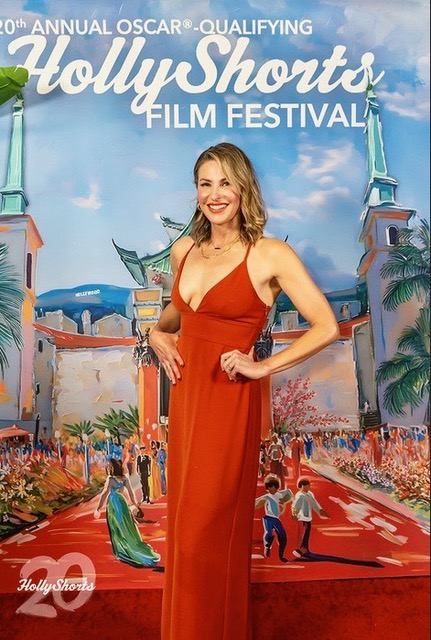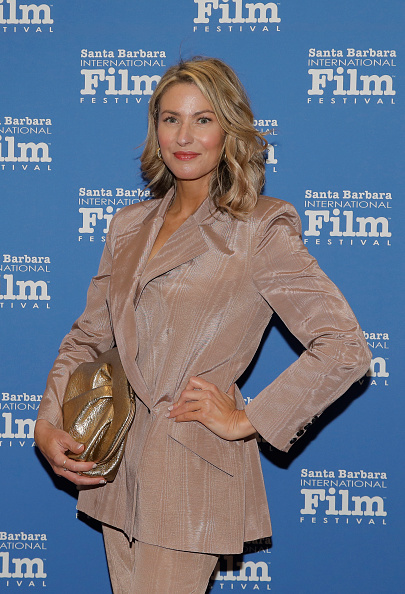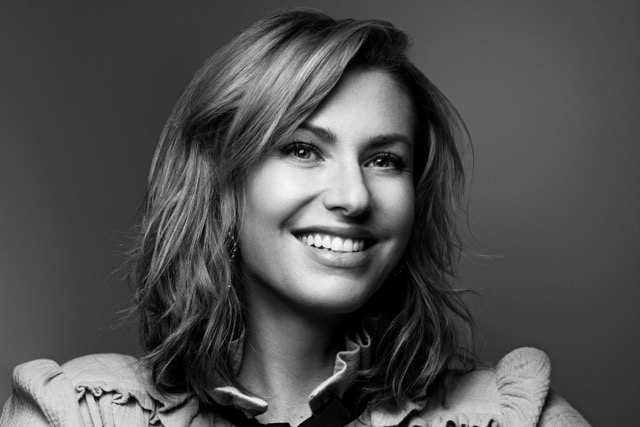The Oscar-qualifying HollyShorts Film Festival recently premiered a short film, “And Now I Lay Me Down,” starring Jane Kaczmarek (“Malcolm in the Middle.”) This new dark comedy follows fading actress Celia Delvi as she as she faces divorce and fading fame.
I was delighted to discuss the achievement with Rani DeMuth, the writer, director and visual artist from Santa Barbara, California.
David:
Hello Rani. Congratulations on the release of your new film “And Now I Lay Me Down.” What inspired you to write and direct it?
Rani:
Thank you, David! Joseph Campbell talks about the dark night of the soul being followed by revelation. That’s exactly what happened to me with “And Now I Lay Me Down.” I was having the worst day ever. I had just lost part of my nose to skin cancer and my film career was at a standstill. On this particular day, rather than masking my pain, I let myself really experience the suffering of not being where I wanted to be in my life, particularly as a film director. In other words, I had a meltdown.
After my meltdown, I meditated for 20 minutes. And when I got up, I saw an entire short film flash before my eyes. “And Now I Lay Me Down” was inspired by the existential dread of losing my looks and career in one fell swoop. Amidst flashes of pink and gold, I saw an aging woman in the film industry dealing with rejection and the challenges of being a mother. And Cheetos.

David:
Describe the difference in your creativity as a writer and director?
Rani:
I can do one in my pajamas and not the other. Though writing and directing come from the same place, they are opposite sides of the coin in terms of modes of expression. Energetically, the director is the yang/masculine/extrovert, and the writer is the yin/feminine/introvert. Directing is all “now,” while writing can stop and go for a walk.
I feel that I can take more creative risks as a writer because I can always hit delete. With directing, unless you are in rehearsal, I feel more restricted because of the dollar signs and ticking clock. Perhaps this will change when I work with bigger budgets. The goal is to retain the same sense of play as you did in the writing process during the last take of the day while you’re losing light.
David:
What is your biggest source of inspiration?
Rani:
My biggest sources of inspiration come from my dreams and meditation. My short film, “The Double” –– starring Eric Roberts –– was based on a powerful dream I had right before 9/11. It shocked me to my core and I knew it would make a great film. I saw a man on a plane that was about to crash. I saw this man astral project out of the plane and find himself in the ocean. He walked out onto the beach in a business suit and then found himself at the airport, waiting for his own plane to land.
I also have many short stories and screenplays inspired by dreams. They all have a magic realism bent. As I mentioned, my recent film, “And Now I Lay Me Down,” came to me in a vision after meditation. Meditation is the closest I get to the dream space during my waking hours, hence providing a great creative space for ideas.
David:
What do you wish you could improve within yourself?
Rani:
I wish I didn’t have some of the classic ADD traits. It can take me two days to pack for a weekend getaway. I’m always looking for my phone, and I often interrupt one task to start another. Being me takes a lot of work! I don’t feel ADD when I direct or get into a writing groove. I write best when I turn off the Internet, so I don’t accidentally find myself doing a “What’s Your Aura” quiz when I have a deadline.
I could also be more patient as a mother. I have a neurodivergent nine-year-old. I have to work on not yelling at her when we are late for something and it takes her an hour to put on her shoes.
David:
What are you most proud of when you reflect on your work as a writer and director?
Rani:
I am most proud of my short films, “The Double” and “And Now I Lay Me Down.” I’m most proud of my screenplays, “Suki And The Moon” and my feature script, “End Of The Line.” I have a fantasy of combining all my narrative shorts into an anthology series called “Seven Ways To Die And Keep On Living.” All the shorts are magic realism narratives about people escaping death in fantastical ways.

David:
What do you value most in others, personally and professionally?
Rani:
I value kindness more than anything else. I believe in the golden rule: do unto others as you would have them do unto you. This goes across the board, both personally and professionally. I also value a good sense of humor and imagination. I also appreciate a sense of style.
David:
Who is someone in the entertainment industry that has had an impact on your work?
Rani:
Woody Allen has inspired me more than any other filmmaker. Despite the controversy surrounding him, I believe we shouldn’t dismiss his work, because doing so would mean disregarding the amazing performances by the women he directed.
“Annie Hall,” “Manhattan,” and “Hannah And Her Sisters” have been hugely influential. Woody Allen redefined the cinematic language. Watching Diane Keaton come out of her body while she has sex with Allen because she’s bored, having a film director tell Robin Williams to go home and “sharpen up” because he appears “out of focus” both on and off camera, and revealing Allen’s mother as a gigantic apparition over Manhattan after her death –– continuing to bother Allen but now in front of the entire city –– were all moments unlike anything I had ever seen from a filmmaker. I love the comical and insightful ways he deals with our own mortality.
David:
If you could have a conversation with someone that has passed on who would it be? And what question would you ask them?
Rani:
I would meet Madame Blavatsky. She is a Russian mystic and co-founder of the Theosophical Society. She was obese, held seances, and smoked a cigar. She was way ahead of her time, and probably nuts. “The Voice of the Silence” is her most famous work. I would ask her about her involvement in the 1870s Spiritualist movement. I’m interested in making a film about this.
David:
What advice do you have for people struggling to make it in the entertainment industry?
Rani:
Well, I’m still struggling to make it in the entertainment industry. The advice I give myself is to connect with what moves me. The industry will always ebb and flow, but your connection to your material is constant.
Stress comes from worrying about the future. Eckhart Tolle’s “The Power of Now“ is my go-to book when I am struggling.
David:
Thank you for your time. Any words of wisdom to all the readers?
Rani:
There is only one you, and you are enough.
To view the film’s trailer on Instagram:
https://www.instagram.com/ranidemuth/reel/C-YGVLMtpEw/

